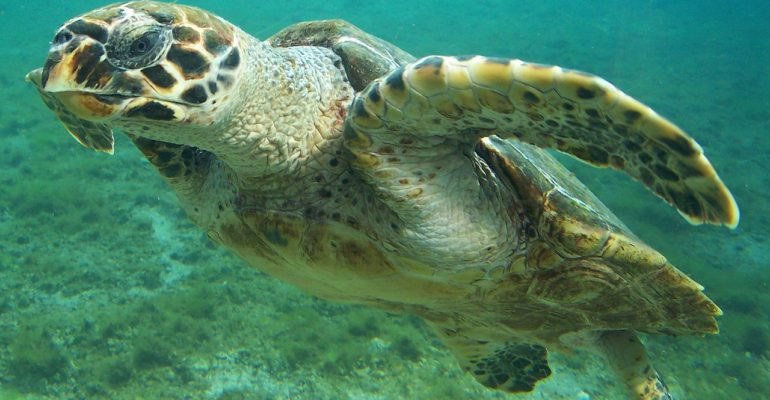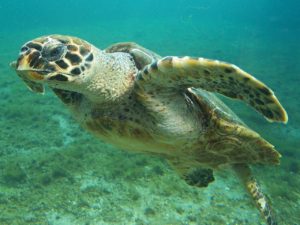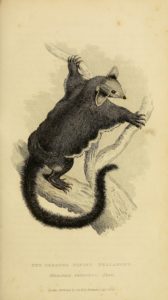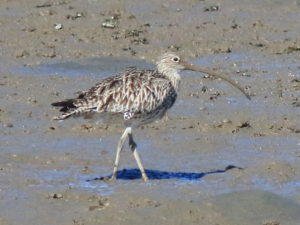
Hawksbill turtles, greater gliders and various shorebirds are some of the Redlands wildlife to benefit from increased Queensland Government protection measures.
State Environment Minister Dr Steven Miles has confirmed that Queensland’s Species Technical Committee (STC) wants 21 species given increased environmental protection.
The Committee has recommended nine species be reclassified as ‘endangered’. The criteria for an ‘endangered’ listing under Queensland’s Nature Conservation Act include that a species may be in danger of extinction.
Many of these endangered species occur in the Redlands, according to the Redland City Council’s Biodiversity strategy 2008-2012.
Hawksbill turtle to get an ‘endangered’ listing

Hawksbill turtle Photo: B.navez
The Hawksbill turtle will have its Queensland conservation status increased to ‘endangered’. Hawksbills are one of six turtle species found in the Moreton Bay Ramsar site and Moreton Bay Marine Park.
Dr Miles has previously drawn attention to Moreton Bay’s “beautiful turtles” which are being killed by plastic ingestion and being struck by boats and other vessels.
“More than half of the marine life killed by boats and other vessels in Queensland is in Moreton Bay,” Dr Miles said.
Under the Federal Government’s Environment Protection and Biodiversity Conservation (EPBC) Act, the conservation status of hawksbill turtles is ‘vulnerable’ In 2003 the Federal Government adopted a Recovery plan for marine turtles in Australia.
Hawksbills have been classified by the World Conservation Union (IUCN) as ‘critically endangered’ since 1996.
Greater gliders are vulnerable in Queensland

Greater glider – a drawing made in 1827
Earlier this year the Federal Government recognized that greater gliders were ‘vulnerable’ under the EPBC Act.
Queensland will now follow suit by declaring them “vulnerable’ under the Nature Conservation Act.
Dr Miles said scientists believed the greater glider had moved to a more severe category as a result of a range of threats, including tree-clearing.
“The greater glider feeds almost exclusively on eucalyptus leaves and buds, and lives in trees, so the destruction of its habitat and food source is sure to be detrimental to its survival, he said.
Greater gliders are found in the Redlands where a conservation area in Alexandra Hills is named after them.
Shorebirds becoming endangered

Eastern curlew on the Toondah Harbour tidal flats
Some migratory shorebird species will also have their conservation status upgraded. Queensland will follow the Federal Government’s lead by declaring the eastern curlew, great knot, red knot curlew sandpiper and lesser sand plover all to be ‘endangered’.
These shorebirds are all found in the Moreton Bay Ramsar site together with other bird species now considered to be ‘vulnerable’ such as the bar-tailed godwit and greater sand plover.
The endangered eastern curlew and great knot species are known to occur in and around the proposed Toondah Harbour dredging project, according to information submitted to the Federal Government by Walker Corporation.
A seabird found in Moreton Bay, the wedge-tailed shearwater, will also be declared ‘endangered’ following advice from the Queensland Species Technical Committee.
Queensland species under further threat
Queensland’s Species Technical Committee (STC) has recommended the following new conservation classifications according to news reports.
- Bramble Cay Melomys: extinct
- Wedge-tailed Shearwater: vulnerable
- Hawksbill Turtle: endangered
- Fassifern Blind Snake: vulnerable
- Roma Earless Dragon: vulnerable
- Blackfooted Tree-rat: listing deferred
- Brush-tailed Rabbit-rat: vulnerable
- Greater Glider: vulnerable
- Ghost Bat (Queensland population): endangered
- Yellow-footed Rock-wallaby: vulnerable
- New Holland Mouse: vulnerable
- Palm Cockatoo: vulnerable
- Bar-tailed Godwit (northern Siberian): endangered
- Bar-tailed Godwit (western Alaskan): vulnerable
- Curlew Sandpiper: endangered
- Eastern Curlew: endangered
- Great Knot: endangered
- Greater Sand Plover: vulnerable
- Lesser Sand Plover: endangered
- Red Knot: endangered
- Carpentaria Glass Wren: endangered
- Plains Death Adder: vulnerable.
Redlands2030 – 14 August 2014
Please note: Offensive or off-topic comments will be deleted. If offended by any published comment please email thereporter@redlands2030.net
3 Comments
Re the Greater Glider Conservation area in Alexandra Hills, also known as the R250 Reserve, was an event I was invited to by then MP John Hegarty for Victoria Pt and recall early one morning arriving on site being greeted by then Environment Minister Brian Littleproud, a gentleman who, along with a female Minister from Canberra, handed over to Redland Shire Council recipient, preservation authority for care of the reserve, in perpetuity. For me, it was a memorable day and would like to think gliders still have a home among the gum trees in Alex Hills Reserve.
More warning signs that our development is not sustainable with our environment. The Toondah Harbour residential proposal needs to be dropped on so many levels, not least the damage it will do to these species.
Curious how this protection will be effected, monitored, measured and enforced, since it hasn’t been a strength demonstrated by authorities in recent years. Will there be adverse development penalties applied to operators that fail to observe proactive checklists, acknowledge endangered species habitats, lives or environments, and more for outright negligence and disobedience in contempt of the law. Will we see education programs highlighting our feral animal problem, highlighting the fact that untethered domestic animals too, are effecting as many as 30 kills per night according to some authorities. Until we see strategies effected and put in place, its all just meaningless words isn’t it. A lovely intent that is baseless without tangible measures to enforce and protect endangered life.